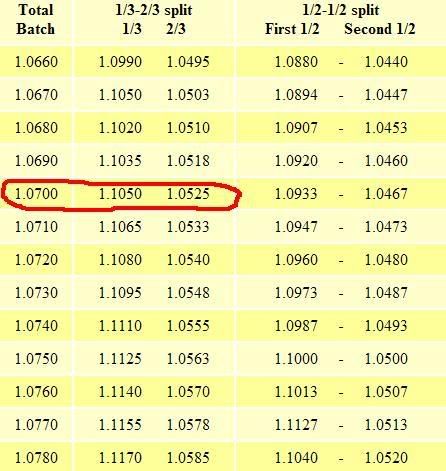Alamo_Beer
Well-Known Member
The_Bird had a post in the big honkin' 999 thread about splitting this puppy up between two mashes/friends. I think my buddy and I are going to do that next weekend. If we could net 5gal of 999 and 10gal of "small" beer that would be awesome. But coming out with 5gal of 999 and 5gal of small beer would rock too...This post might be a little long but I've just got to get all of my thoughts together on this.
Having read this article on partigyle and looking at the charts it looks like I'm going to have to use MORE grain to get what I want. He's saying to formulate a 15gal batch and use this chart to figure out the gravities.
First off, we have to forget about the sugar thats going into the 999. Promash is telling me that we're getting 14 points from it. So, we're looking for a gravity of 1.105. The chart then says this:

That would mean I would have to formulate a 15gal recipe with a gravity of 1.070 based on the 999. Doing so, recipator gives me this as a grain bill:
37.5 lb. Pale Malt
3.26 lb. Munich
1.22 lb. C90
6.5 oz. Special B
0.61 lb. Chocolate
Doing this (according to the article) would give me 5gal of 1.105 and 10 gal of 1.053.
Thats a lot of grain but I guess I can swing it....the only thing I'm lacking is the .22lb of C90, I've only got a pound. I can get the darkest crystal my LHBS has though.
Now, where does efficiency come into this? Or does it not bc you're just dealing with 1st runnings?
Is there anything else I'm missing with this? Reading The_Bird's post made it sound SOO easy. Just split the mash, run off ~3gal from each for the BW and the next 3 for a smaller beer. My concern with that is that I wouldn't hit the 1.105 necissary for the 999 (before the sugar).
Oh yeah, real quick. What about the second, smaller beer? I was thinking something english with fuggles or EKG and S-04 or maybe Irish Ale yeast? Thoughts on that?
Ok, sorry this was long but hopefully this answered some questions for some folks and brought up others for more people.
As always
Having read this article on partigyle and looking at the charts it looks like I'm going to have to use MORE grain to get what I want. He's saying to formulate a 15gal batch and use this chart to figure out the gravities.
First off, we have to forget about the sugar thats going into the 999. Promash is telling me that we're getting 14 points from it. So, we're looking for a gravity of 1.105. The chart then says this:

That would mean I would have to formulate a 15gal recipe with a gravity of 1.070 based on the 999. Doing so, recipator gives me this as a grain bill:
37.5 lb. Pale Malt
3.26 lb. Munich
1.22 lb. C90
6.5 oz. Special B
0.61 lb. Chocolate
Doing this (according to the article) would give me 5gal of 1.105 and 10 gal of 1.053.
Thats a lot of grain but I guess I can swing it....the only thing I'm lacking is the .22lb of C90, I've only got a pound. I can get the darkest crystal my LHBS has though.
Now, where does efficiency come into this? Or does it not bc you're just dealing with 1st runnings?
Is there anything else I'm missing with this? Reading The_Bird's post made it sound SOO easy. Just split the mash, run off ~3gal from each for the BW and the next 3 for a smaller beer. My concern with that is that I wouldn't hit the 1.105 necissary for the 999 (before the sugar).
Oh yeah, real quick. What about the second, smaller beer? I was thinking something english with fuggles or EKG and S-04 or maybe Irish Ale yeast? Thoughts on that?
Ok, sorry this was long but hopefully this answered some questions for some folks and brought up others for more people.
As always



 So THAT'S why everyone tells me my brews are too strong for them. (I've only brewed one sub-1.050 batch so far out of 21 brews. Maybe two of them. I could be wrong. After all, I've been drinking all my beers!)
So THAT'S why everyone tells me my brews are too strong for them. (I've only brewed one sub-1.050 batch so far out of 21 brews. Maybe two of them. I could be wrong. After all, I've been drinking all my beers!)